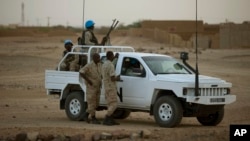The United Nations warns that conflict and insecurity in Africa's Sahel region are worsening the humanitarian crisis there. A senior U.N. official says poor countries in the Sahel are forced to spend more on security and less on humanitarian needs.
The humanitarian problems afflicting the nine countries in the Sahel are enormous. The United Nations reports 25 million people in the region do not have enough to eat. It says 6.4 million children are acutely malnourished. And, half of the 1.2 million children under age five who die each year are dying from malnutrition-related causes.
On alert for Ebola
Most worrisome of all, it says, is the fear that West Africa’s Ebola epidemic might take hold in the region. Senegal, which has had one case of Ebola and no deaths, has successfully stopped the disease from spreading. But, Mali, which has confirmed a fifth case of Ebola, remains on high alert.
U.N. Assistant Secretary-General and Regional Humanitarian Coordinator for the Sahel Robert Piper says these crises continue to worsen because of continued conflict and insecurity in the region.
He says 2014 started on a relatively optimistic note in that the situation in northern Mali seemed to be improving. Unfortunately, he says, this has proven to be false.
In addition, he notes that ongoing conflicts in Sudan's Darfur region, the Central African Republic and Libya continue to cause tens of thousands of people to flee their homes and become internally displaced or refugees.
“Nigeria, however, is by far the biggest concern and the situation there has deteriorated very rapidly during the course of this year," he said. "The numbers are enormous. Internal displacement for Nigeria has jumped from about 600,000 people six months ago to 1.5 million today. We have about 100,000 Nigerians that have crossed the border into Niger and into Cameroon. Nigeria without question is of enormous concern.”
Security vs. humanitarian needs
Piper said conflicts in Mali, Nigeria and other countries are forcing poor nations in the Sahel to beef up their security by diverting resources away from humanitarian needs.
“We are seeing this in Niger, for example, funding that really should be going to the social sectors in an ideal world ending up in the security budget because it has to," he said. "You have to secure your borders if you have got Libya in your north and Mali to your west and Nigeria to your south. You are going to be spending some money on security inevitably. We do not question that, but it has got to come from somewhere. And, of course, ultimately it is going to come from some of the social sectors that are going to translate into reduced humanitarian budgets in the long run.”
Programs to help the Sahel are not exactly flush with money. The U.N. has received only 57 percent of the $1.9 billion appeal for humanitarian operations this year.
And now, the world body is mounting an operation to prepare for a possible outbreak of Ebola in the Sahel. This operation includes providing lab equipment, an isolation area to quarantine people, a treatment unit, and personal protection equipment. Because of the funding shortage, it is not clear how many of these requirements will be met.




